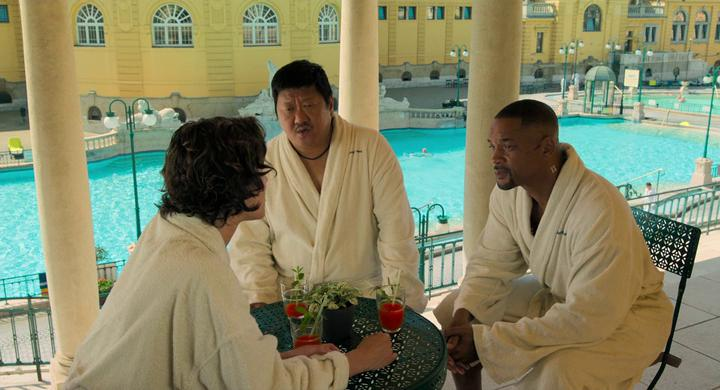GEMINI MAN
Dir. Ang Lee
2019
This is one of those rare movies where I get mad because the people who like it don’t like it enough for me. Gemini Man isn’t just “a well directed movie with a bad script.” Gemini Man fucking rocks. Gemini Man, directed by Crouching Tiger Hidden Dragon and Brokeback Mountain’s Ang Lee, is a combination of the high-octane masterpiece action he’s still maybe most acclaimed for with the sensitive humanist sentimentality of his adaptation of Sense & Sensibility or his masterpiece Eat Drink Man Woman.
Under another director, I don’t doubt the dialogue in this film would clang left and right. There is a lot of exposition required to tell the story of Henry Brogan, ex-US government assassin and now fugitive being hunted by his own youthful clone. The most obvious comparison for this movie is to Hideo Kojima’s Metal Gear Solid, a saga about genome soldiers, crossed allegiances personal and political, and full of the same ridiculous over-the-top bullet time action you see in Gemini Man.
This film excises Metal Gear’s famous extended political diatribes (for those who don’t play games, these basically play out like Donald Sutherland’s extended monologue in JFK, complete with archival footage) and places any monologue in the mouth of either Will Smith or Will Smith, the sole exceptions belonging to Clive Owen’s villainous Clay Verris. The Verris scenes largely play out like a more standard villain from a 90s film, though there are some pleasantly disarming moments where he can’t help but actually show some affection for his favorite experiment. It’s an interesting choice, the sort other directors would probably excise so he were easier to hate. Ang Lee understands that his villains are best when they have their weaknesses.
The dual Smith performances are honestly pretty remarkable. Younger Will as Junior put some effort into playing him closer to Bel-Air; a famous anecdote claims Ang Lee told Smith he needed to “be a little more wooden, act worse” because the maturity of his portrayal was spoiling the effect. Older Will as Henry plays the disaffected glaze of an easygoing snark in a way always betraying the pain underneath. He doesn’t play it like a violent sociopath, either – it’s represented more personally, as someone who recognizes that their life choices led them to create a bubble of alienation and excess that never really provided room for intimacy or growth. The mask falls during a confrontation with Junior, and Smith plays the growing crescendo of doubt swallowing him whole.
That scene in particular is so fascinating to me as a representation of the way therapists talk about the therapeutic dialectic. The older Smith looks at his younger self and addresses every insecurity, every trauma, every happy memory and every impulse with the neutrality of an outside observer, and both performances are forced to reckon with how it feels to both witness and be witnessed at the same time. These are simultaneously the things that make them the same and yet the expression of them inherently divides them across a mass gulf in power and experiences. How do you talk to yourself? How does the inner voice that tells you these things treat you, and how do you respond as both audience and presenter?
There are other ways to dig into the ways this film says things about concentrations of power, abusive dynamics, denial, transactional relationships. Admittedly, they largely aren’t that deep – what they do is provide a structure to what is just whip-ass action. In their first big fight scene, one Will Smith throws a grenade and the other shoots it out of the air back at him. Later, one of them roundhouse kicks the other with a motorcycle. There’s a lot of really wonderful wirework in this film, and transposing it into the modern era results in a lot of Mom’s Dead Parkour. Lee’s direction of action is just so much better than so many of his contemporaries, and I’m surprised by the dismissal of this film on those grounds alone.
I unfortunately never got to see the film in True Ang-O-Vision, 120fps 3D 4K, but in 60fps it’s still pretty breathtaking stuff. The effect of the high frame rate and 4K capture has me looking at every action scene and going “how the fuck did they do that?” It serves the more dramatic conversations well, too, as Smith is so good at playing the growing microexpressions through a scene, and it obscures some of the uncanny of the de-aging. If you don’t have access to the 4K Blu-Ray for that 60fps presentation, we’ll have to watch it sometime.

